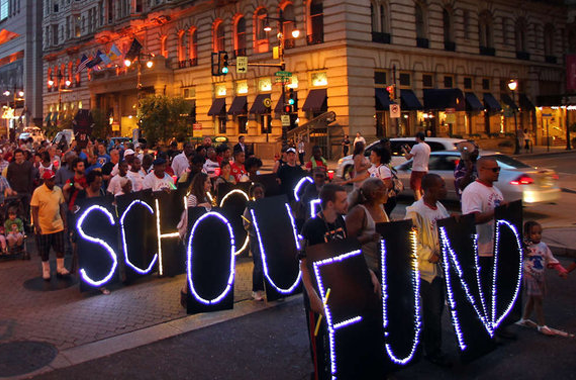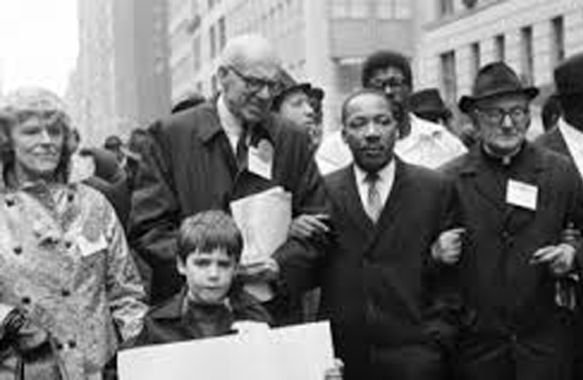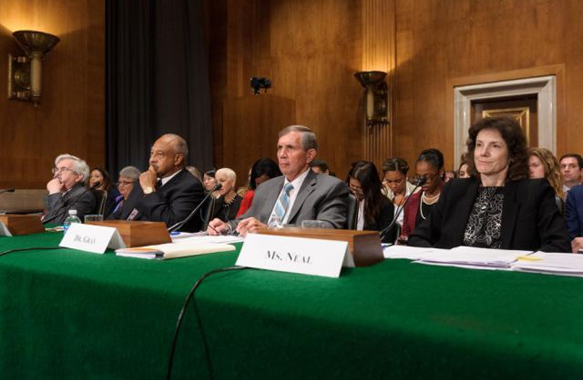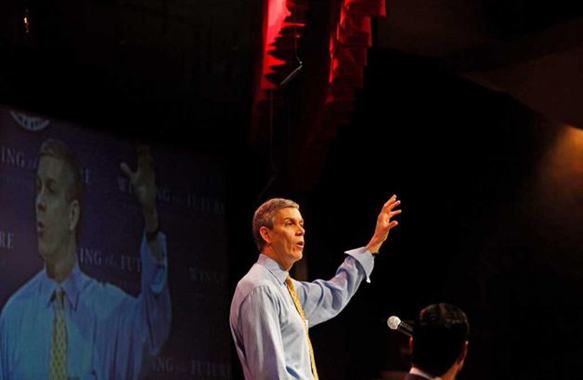Philly Schools Consider Suing Wall Street Banks For Fraud-Induced Losses
By Daniel Denvir | Originally Published at City Paper. August 5, 2013
The School District of Philadelphia is considering filing suit against Wall Street banks, City Paper has learned, for illegally manipulating a major interest-rate index underpinning complex derivatives that have cost cities and schools billions of dollars. ”The School District is currently in the process of analyzing whether or not the agency has a sufficient basis for pursuing claims against financial institutions which may have been involved in the manipulation of Libor,” a district spokesperson wrote in a short statement issued to CP.
Philadelphia and other cities have filed similar lawsuits, contending that such “interest-rate swaps” — billed as a protection against rising borrowing costs — were tilted in banks’ favor through the fraudulent rigging of the London Interbank Offered Rate, or Libor. The School District took out swaps with (purchased by Wells Fargo in 2008), Merrill Lynch, Goldman Sachs and Morgan Stanley . But a lawsuit could name more banks as defendants. Philadelphia’s lawsuit names banks that were direct counterparties and also those that are accused of rigging Libor, including Citi, JPMorgan, RBC, Bank of America, Barclays, Credit Suisse, Deutsche Bank, RBS and UBS.
It is unclear when the district, which is run by the state-controlled School Reform Commission, will decide whether to file suit, and what damages might ultimately be sought.* The city could seek tens of millions of dollars, says Quinn Emanuel attorney Steig D. Olson , one of the lawyers representing the city. The precise damages at stake — a matter of figuring out how particular Libor manipulations affected particular swap deals — will be determined through discovery. The final damages will likely be contested. And profoundly complex.
A successful lawsuit, however, could provide sorely needed revenue to Philadelphia schools, which are experiencing the most recent and severe of recurrent fiscal crises. Budget cuts orchestrated by Gov. Tom Corbett have exacerbated historic underfunding, while rampant charter-school growth has siphoned money and students. The result is a “doomsday” budget gap of $304 million and the resulting layoff of 3,859 teachers and critical staff. This after 24 schools were closed for good in June. Only a small portion of that gap has been filled — and only tenuously so. Just a fraction of laid-off workers have been called back. The District has also borrowed more money and sunk further into debt.
As CP reported in May, Philadelphia schools debt service is ten times the national average. Advocates have encouraged municipalities and school districts to take action against banks, which were saved by a taxpayer-funded bailout despite profiting from predatory financial transactions with public entities. ”I encourage the School District of Philadelphia to do everything in its power to punish big bank wrong-doing and find money for our kids,” says Hanif Palmer , a parent and activist with the labor-backed organization Fight for Philly , which has pushed for action on swaps. “I hope they will also consider legal action against big banks for toxic swap deals that have also cost the school district and city millions of dollars.”
Philadelphia schools lost $161 million from interest-rate swaps, according to a 2012 report by the left-leaning Pennsylvania Budget and Policy Center . Interest-rate swaps set borrowing costs for bond issuers (such as municipalities and school districts) at a fixed rate. The banks — and this is where it gets confusing — then pay the bond issuer based on a floating interest rate, determined by an index such as Libor.
Swaps protect public entities from rising borrowing costs. But after the federal government drove interest rates down to spur economic growth in the wake of the economic crisis, cities and school districts were stuck paying banks at a high interest rate even while banks paid public entities at a low one. Cities and districts often paid heavy termination fees to exit the costly agreements. One 2012 report from the Refund Transit Coalition finds that 1,100 swaps with public entities — including fiscally distressed SEPTA — cost taxpayers $2.5 billion each year.
But recently, the moral and political case against interest-rate swaps has gained a sharp legal edge: It was revealed that banks were manipulating the Libor, an index tied to $300 trillion in financial instruments set by banks with no external oversight. Banks report how much they would pay to borrow from other firms on a given day. On the honor system.
Britain’s Barclays and RBS and Swiss UBS have, according to Reuters, paid about $2.6 billion in penalties to U.S. and British regulators over Libor manipulation. One estimate puts losses related to Libor fraud at as much as $176 billion. The city’s lawsuit alleges that banks employed “collusive and fraudulent manipulation of the key pricing terms in contracts … in order to reap tremendous windfall profits at the expense of those governmental entities and U.S. taxpayers.”
The banks sued by the city were all members of the British Bankers’ Association, who allegedly colluded to set Libor rates in their own collective self-interest.
“Defendants in this case worked together to suppress Libor, which had the immediate effect of raising the amount paid by the municipal party” — the City of Philadelphia. And “in the event the swap was terminated, suppression of Libor inflated the termination payments that had to be made.”
The city’s lawsuit states that while “banks promoted” swaps “as a low-risk” borrowing strategy, “these instruments proved to be extremely risky, and have cost state and local governmental entities hundreds of millions or even billions of dollars, depleting treasuries, ruining budgets, and hindering the delivery of public services.”
The district is currently negotiating a new contract with the Philadelphia Federation of Teachers, and is seeking $130 million in total labor givebacks. Meanwhile, Corbett has conditioned $45 million in one-time aid to the district, derived from federal and not state funds, on labor concessions. City teachers, who already make 19 percent less than some suburban counterparts but work in sometimes extraordinarily challenging environments, are resisting a salary cut.
Correction: The School District of Philadelphia will not require authorization from the School Reform Commission (SRC) to file a lawsuit against the banks.












Leave A Comment